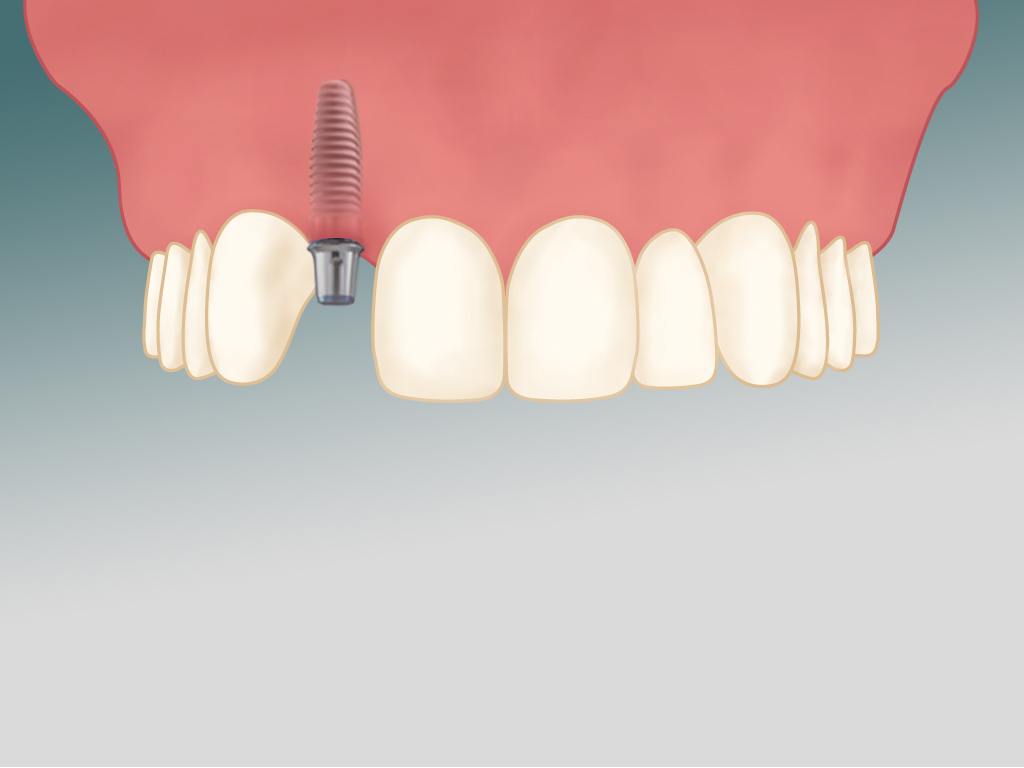Call Us - 02 9415 2777
Dentist Implants
Overview

Regardless of the aesthetic and psychological reasons, missing teeth should be replaced. Each and every gap in your tooth placement potentially poses problems to your long term dental health. One missing tooth can ultimately lead to the loss of additional teeth and ultimately a change in your facial appearance over time.
The missing tooth can lead to a chain reaction. Adjacent teeth can collapse into the gap, while teeth in the opposing jaw can grow into the gap. Missing teeth can affect nutrition and well-being, as the types of food that can be consumed are often limited, hence resulting in deficiencies in vitamins and nutrients. For example, denture wearers often find it difficult to eat nuts, seeds and crunchy raw vegetables. Missing teeth also causes the bone to gradually break down as the bone resorbs and gives patients a sunken face or “the witches look”.
Unlike conventional dentures, dental implants are permanent anchors and eliminate problems of poor fit, gum irritation, pressure points and food trapping under dentures and do not have an odour associated with them.
DENTAL IMPLANTS Overview
What are Dental Implants
Dental implants look, feel and function like your natural teeth and have the highest success rate for tooth replacement (over 95%). They prevent bone loss and shrinkage of the jawbone which can make the face look older and therefore implants gives you a younger looking appearance.
DENTAL IMPLANTS OPTIONS
Single Implants
If you are missing only one tooth, a dental implant is often the best choice. The dental implant replaces the lost tooth root and acts as post for the implant crown. Grinding the neighbouring teeth is not necessary so healthy tooth structure is preserved. The dental implant replaces the function of the tooth root and transmits the chewing force from the tooth crown to the jaw bone. This natural stress keeps the keeps the jaw bone vital so that it does not resorb. Learn more about single implants here.
Multiple Implants
For two or more missing teeth, a bridge supported by implants counteracts bone loss and protects the remaining healthy teeth. A bridge firmly anchored to provide an aesthetically pleasing and functional result that helps prevent further loss of natural bone. Learn more here.
All-on-4® Concepts
The All-on-4® concept refers to a procedure where patients receive just four or more implants and a full set of new replacement teeth within a day! It is the most common treatment in our clinic today for a full arch rehabilitation. Learn more here.
TIMELINE
The first step of the dental implant procedure is a comprehensive initial consultation where your teeth, gums and jaw are examined.
A 3D CBCT scan is required at this stage to determine the implant positions and to assess the amount of bone to secure the implant.
A detailed treatment plan is then provided to you detailing the costs and appointments needed for your procedure.

On the day of your implant surgery, we will uncover the gum to insert the implant under the jaw bone, usually under local anaesthetic or intravenous sedation if preferred. This procedure will take approximately 1 to 2 hours depending on the number of implants to be placed. Once in place, the implant is left to heal and integrate into the bone for 3-6 months. If necessary, a temporary crown can be fitted for this interim period.

Once the laboratory completes the final restoration, this is secured into the implant abutment, giving you a natural looking and comfortable smile.
DENTAL IMPLANT TIMELINES AND PROCEDURES

This consultation is crucial because preparation is key to the success of your procedure. A 3D CBCT scan is an important part of the preparation process as it helps point out where the implants need to be placed and provides information the amount of healthy bone you still have left and where the nerves are to avoid.
During the consultation, our dental specialists will work with you to assess the costs and then suggest a detailed treatment plan devised throughout the consultation process in addition to an appointment plan.
The implant surgery itself is a simple procedure. At the implant appointment we will uncover the gum to expose the tissue of the area being treated, after which an implant is inserted beneath the jawbone. While this sounds painful, you have nothing to worry about – it’s done using local anaesthetic or intravenous sedation.
The length of the procedure will vary based on how many dental implants you need and may take up to two hours. After surgery, the implant will slowly osseo-integrate and will take anywhere from 3 to 6 months to fuse with the bone. If required, we can add a temporary crown over the top so that you feel more comfortable while it heals.
After the healing period, an abutment is placed and a digital impression of your mouth is taken. This enables the lab to fabricate a customised new set of teeth to fit your jaw. Afterwards, we here at CARE Implants fit the final restoration on your implants and leave you with a brand new natural gleaming smile.
The length of the procedure will vary based on how many dental implants you need and may take up to two hours. After surgery, the implant will slowly acclimate and will take anywhere from 3 to 6 months to fuse with the bone. If required, we can add a temporary crown over the top so that you feel more comfortable while it heals.
After the healing period, an abutment is placed and a mould of your mouth is taken. Through this mould, a special new set of teeth are created to fit your jaw. Afterwards, we here at Care Implants fit the mould onto your implants and leave you with a brand new, gleaming smile – no one will even realise you’re rockin’ artificial teeth!

All about dental implants
Losing a tooth can be a challenging and tough time. Not only causing people to become self-conscious and embarrassed about their appearance but also affecting the way we eat and speak. Luckily, implant dentistry has many options that will refill your gaps and have you smiling broadly again in no time.
One of the most popular treatments to replace missing teeth, dental implants is an effective way to restore the natural state of your smile using artificial replacements. By implanting metal posts into the jawbone, dental implants are permanent replacements. After a few months, the posts will fuse to the bone and ready for permanent dental crowns to be attached.
The importance of replacing missing teeth
While losing a tooth or a couple of teeth can cause confidence and self-esteem issues regarding one’s appearance, it can cause much deepe problems too. When you lose a tooth, the jaw bone beneath the space begins to deteriorate — as the missing tooth no longer stimulates bone growth. Over time, this can cause your jaw to collapse in certain areas — leading to bite problems and the exposed roots that are susceptible to infection.
Dental implant treatment can help restore the stimulation needed for natural bone growth and protect other teeth and gums from infection and decay — acting as a barrier where food and bacteria could otherwise get trapped. Also when teeth are lost, teeth can move and cause problems like bite collapsing and tipping, leading to food trapping.
Different types of dental implants treatment
Whether you are missing a single tooth, multiple teeth or all of them, there are different dental implant treatments that can solve your problem. At CARE Implants, we have 3 main dental implant options:
- Single dental implants — For those missing one tooth, only a single implant is necessary to replace the lost tooth root and preserve the rest of your teeth and your jawbone.
- Multiple implants — If you have two or more missing teeth, a bridge supported by dental implants will counteract bone loss and protect the remaining healthy teeth. The results will be not only aesthetically pleasing but also completely functional and prevent further loss of natural bone.
- Full arch All-on-4® concepts — A most common treatment at our clinic, the All-on-4® concept is a procedure where patients receive four or more implants or a full set of new replacement teeth within a day.
Care Implants — the place to go for dental implants in Australia
Unlike conventional dentures, dental implants are permanent anchors and eliminate problems of poor fit, gum irritation, pressure points and food getting trapped underneath. And what’s even better is that dental implants don’t need to be expensive. At CARE Implants, we have over 25 years of experience in complex aesthetic and implant rehabilitation, so you can rest assured that you’re in the best hands. To book a consultation with us, click “book appointment” on our website and choose your preferred time and date.
For more information about our dental implant treatments or if you have any questions, please don’t hesitate to get in touch with us online.
